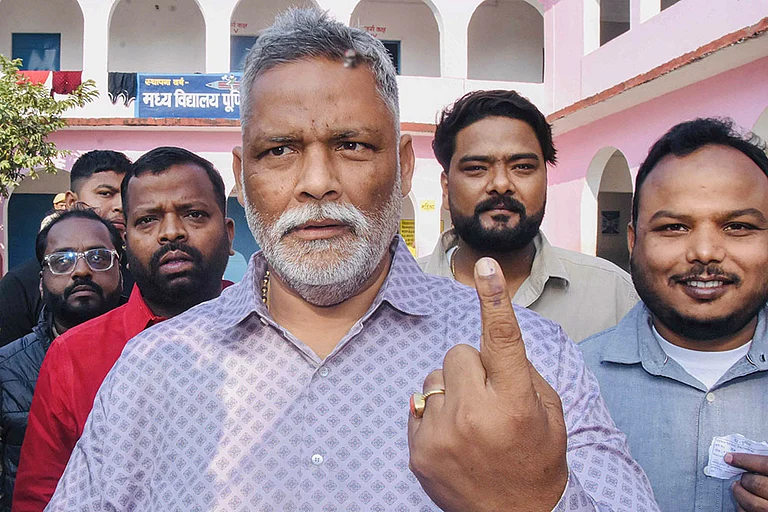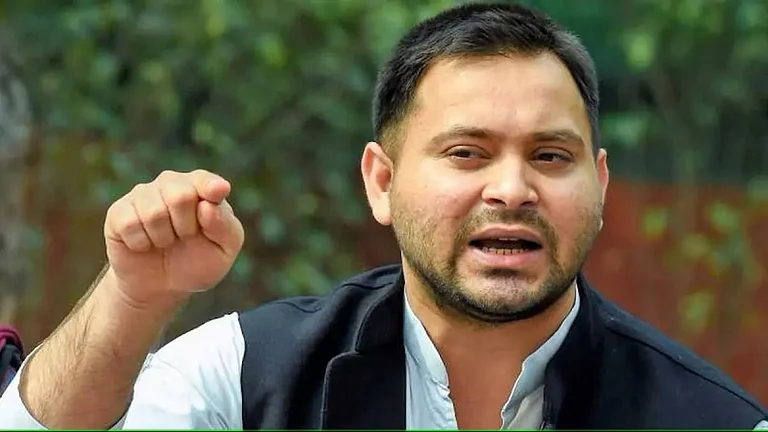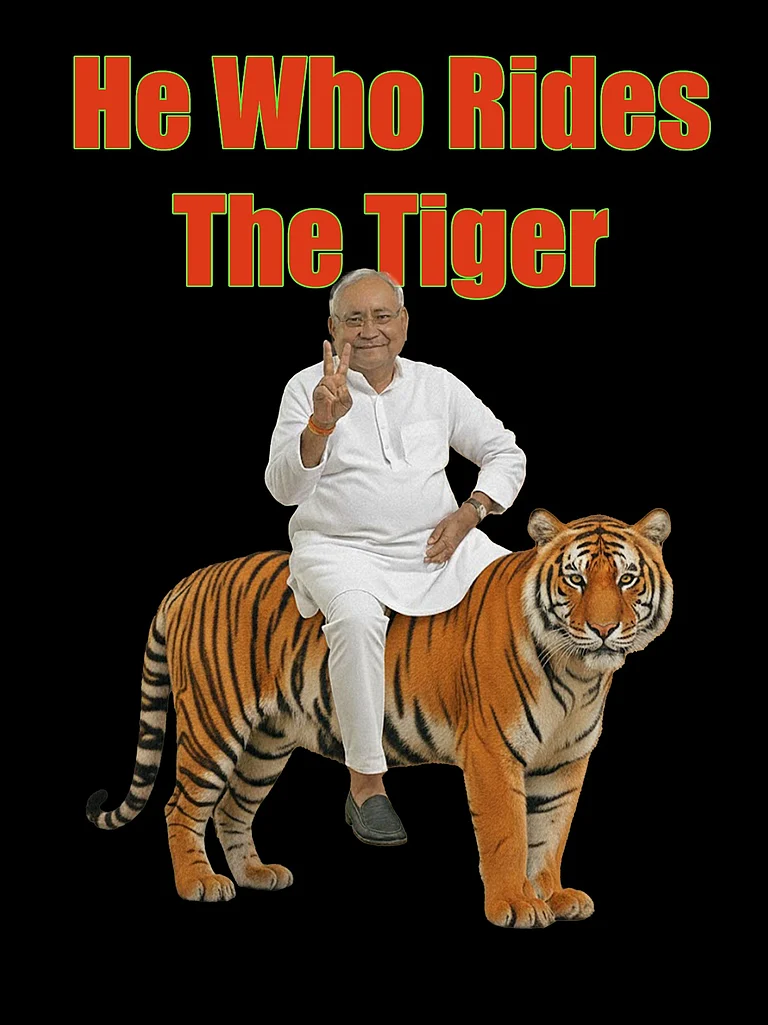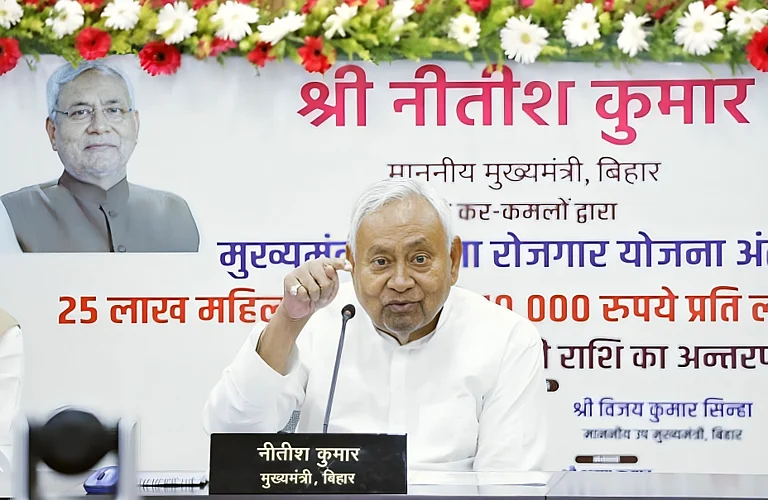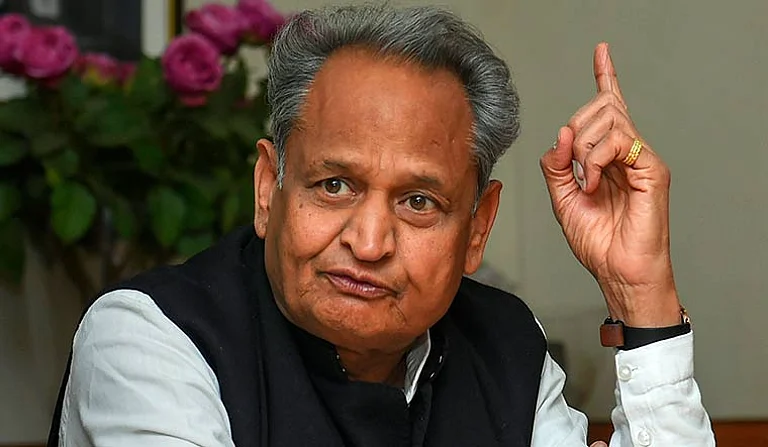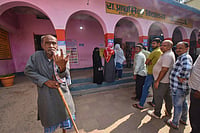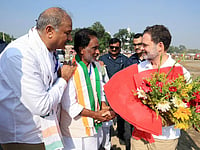
BJP achieves dominance in Bihar elections, securing over 200 seats.
Nitish Kumar’s governance and policies continue to influence the state’s political landscape.
Bihar voters reward continuity, stability, and long-term administrative credibility.
The evening after Bihar delivered its electoral thunderclap did not feel like an evening of triumph alone. Patna slowly sipped it tea, as if unsure whether to step into celebration or contemplation. The evening's firecrackers are still lighting up the low winter air. And then, near 1, Anne Marg a road that has witnessed more turns of Bihar’s political wheel than any other, a banner appeared, quiet but defiant in its message:
‘Tiger Abhi Zinda Hai.’
It was not a slogan of denial, not the last roar of a leader refusing to step aside. It was something softer, steadier, a reminder that Bihar does not forget its architects even when it chooses new custodians. And even as I write this piece, the NDA is leading with more than 200 seats, a dominance that leaves little room for ambiguity about the direction in which the mandate has turned. The BJP may have swept the state, Narendra Modi’s national charisma may have fused seamlessly with the party’s organisational muscle, and the RSS may have done what it always does, prepare the ground invisibly, but even in this political landslide, Nitish Kumar’s imprint remains unmistakable.
Politics in Bihar is never merely about who wins; it is about who remains.
And Nitish Kumar remains, as idea, as memory, as habit.
The Mandate and the Message
The people of Bihar have spoken with a clarity rarely seen in the state’s fractured political landscape. They have given the BJP not just victory, but hegemony. The party has crossed the psychological threshold, it is no longer a partner, no longer a force that must negotiate its space. It stands alone at the centre of Bihar’s new axis of power.
But hegemony is never merely arithmetic. It is narrative. It is inheritance. And this mandate carries within it several layered messages.
That Bihar, after decades of coalition feng shui, is ready for a singular force; that the BJP has outgrown its anxieties in a state where caste arithmetic once fenced its ambitions; that Modi’s appeal has seeped deeper into Bihar’s subconscious than many analysts anticipated; and that the RSS, with its quiet calibrations, has delivered its most successful Bihar project yet.
But amidst the floodlights and the saffron surge, there is a quieter message, the kind that takes longer to hear:
Nitish Kumar has not been defeated. He has been transformed.
He has moved from being the principal axis to being the moral elder, the reference point against which Bihar will measure governance for years.
Nitish Kumar: The Long Architect
Ramachandra Guha once said that Nitish Kumar is ‘one of the most thinking politicians of our time.’
It was not praise for praise’s sake. Guha understood a particular truth about Nitish Kumar: that his politics was not sculpted through spectacle but through problem-solving. He approached governance like an engineer, meticulous, slow, almost invisible in his methods.
In a state battered for decades by neglect, violence, and social despair, Nitish Kumar’s years in power produced a subtle but profound transformation. Roads were built, not as symbols, but as necessities. Schools opened in forgotten hamlets. Women stepped out, travelling miles on bicycles assembled in homes that had once never imagined mobility. Bihar’s middle class emerged not through sudden prosperity but through stability, a gift rare enough to be cherished.
His ‘soft chhavi’, often caricatured by his critics, was precisely what soothed a post-Lalu Bihar. He introduced a grammar of governance that neither shouted nor swaggered. And it was this reliability, this refusal of drama, that earned him the moniker ‘Sushashan Babu’ not as a political brand but as an administrative memory etched into households that saw everyday life becoming just a little more orderly, a little more predictable.
The people, especially women, trusted him not because he promised revolution but because he delivered routine.
In the vocabulary of Indian politics, Nitish Kumar is an anomaly, a leader who earned credibility through steadiness, not noise.
The Women’s Republic of Nitish
To understand Nitish Kumar’s continued relevance, one must understand his most enduring constituency, the women of Bihar.
They voted for him like a quiet republic. Year after year, cycle after cycle, ballot after ballot.
Not because he courted them with slogans.
Not because he weaponised their aspirations.
But because he saw them, not as caste, not as vote bank, not as political instrument, but as citizens.
The bicycle scheme changed more than mobility; it changed the imagination of girls in rural Bihar. Scholarships introduced options. Prohibition was controversial among elites, mocked by pundits, but in the courtyards of villages it became a promise, a night without fear.
If Bihar’s sociological map looks different today, it is because Nitish Kumar rewrote the gender lines quietly.
Modi, the BJP, and the Long Handshake
For all the political theatre of breakups and patch-ups, the Modi–Nitish relationship has been one of the most enduring handshake stories in Indian politics.
Both have disagreed.
Both have walked away.
Both have returned.
And both have known, deep down, that they needed each other.
Modi provided Nitish the national shield; Nitish provided Modi the regional spine.
This election, with its resounding mandate for the BJP, is being read by some as Modi’s complete eclipse of Nitish Kumar. But that is an incomplete reading. Nitish is no longer the rival of the BJP; he is its reference point. Every future government in Bihar — saffron or otherwise, will be measured against the governance template he established.
This is not eclipse; it is legacy.
A Poster, a Memory, a Mood
And so, the poster near his residence
‘Tiger Abhi Zinda Hai’ was less about roaring and more about remembering.
Nitish Kumar has had his years of exhaustion, of indecision, of political zigzags. But the state does not forget quickly. The transformations he delivered live in the everyday rhythms of Bihar. The roads one drives on, the schools one passes, the girls cycling in dusty lanes, all of this is Nitish Kumar’s long shadow.
He may or may not return to the centre of power. But his relevance is intact.
Not all leaders leave behind blueprints; some leave behind cultures.
The BJP’s Arrival
This election has confirmed the BJP’s new status in Bihar, not a partner, not a negotiator, but the central power.
Three forces converged:
1. Modi’s national charisma, which remains undiluted in the Hindi heartland.
2. The BJP’s organisational sweep, strengthened further by Amit Shah’s meticulous micro-management and strategic oversight.
3. The RSS’s invisible latticework, supported by the NDA’s local leaderships who carried the message to the booth and the mohalla with discipline and patience
In the districts, the RSS operated like an underground stream, unseen, unheard, yet shaping everything it touched.
The result is not just victory; it is establishment.
Lessons for Rahul and Tejashwi
This mandate is also, unmistakably, a rebuke to the Congress-RJD imagination of politics.
Rahul Gandhi, earnest, sometimes electrifying, but often distant, could not stitch the trust Bihar demands. Politics here is not a touring performance; it is habitation.
Tejashwi Yadav has youth, energy, agility. But Bihar has seen enough dynasties to know the difference between inheritance and competence. His rallies drew crowds, but crowds do not always translate into confidence.
If there is a lesson for them, it is this:
Bihar does not vote for improvisation.
It votes for continuity.
The Collapse of Experiments: VIP and Jan Suraj
Mukesh Sahani attempted to ride caste assertion like a borrowed horse.
Prashant Kishor attempted to reinvent Bihar like a consultancy pitch.
Both misread the state.
Mukesh Sahani’s theatrics had volume but no velocity. He mistook attention for trust.
Prashant Kishor’s Jan Suraj was a well-lit idea with a hollow interior — a movement without movement.
Bihar does not fall for political experiments that lack emotional memory.
Nitish Kumar: The Elder in the Room
When the dust settles, and when the BJP forms its government with confidence instead of caution, one truth will linger ‘Nitish Kumar remains the elder in Bihar’s political room.’
He is no longer the centre of negotiation.
He is no longer the pivot around whom governments rotate.
But he remains the measure, the quiet, inconvenient standard.
Every road that is built will be compared.
Every welfare scheme will be benchmarked.
Every administrative decision will be held against a decade and a half when governance was not spectacle but method.
Leaders fade, but legacies do not.
The Future, Written Between Two Poles
Bihar now stands suspended between two distinct poles — on one side, the BJP’s new hegemony, assertive, expansive, and hungry for a long-term chapter; on the other, the long shadow of Nitish Kumar, calm, technical, and still deeply resonant in the rural memory that refuses to fade with the speed of electoral cycles. Between these two forces lies the undefined shape of Bihar’s political tomorrow.
And then, there is the poster outside Anne Marg ‘Tiger Abhi Zinda Hai.’ It is more than defiance; it is a reminder that political memory in this state is not wiped clean by a single mandate. Bihar remembers slowly, forgets slower, and often keeps its loyalties folded deep within its silences.
Epilogue
This election belongs to the BJP.
The moment belongs to Modi.
The machinery belongs to the RSS.
But the morning after, that belongs to Nitish Kumar.
Bihar, in its instinctive wisdom, often separates the verdict from the mood. It votes pragmatically but remembers emotionally. And in that space of memory, Nitish Kumar remains woven, in the bicycles of girls, the dignity of women, the sobriety of middle-class expectations, the dream of a state that once tasted stability after decades of despair.
The BJP will govern with confidence now. It has earned the right. But Bihar’s political heart is a slow river. It remembers its engineers. It remembers its reformers. It remembers those who gifted it dignity without demanding applause.
And Nitish Kumar, architect, engineer, thinker, reluctant warrior, remains one of them.
The mandate may have rewritten the power map.
But the story of Bihar still carries his handwriting.
(Ashutosh Kumar Thakur writes regularly on society, literature, and the arts, reflecting on the shared histories and cultures of South Asia.)







